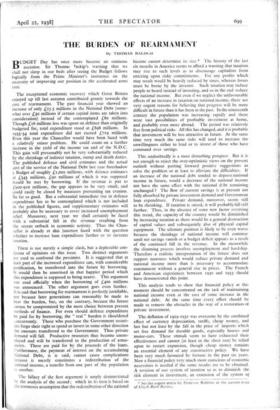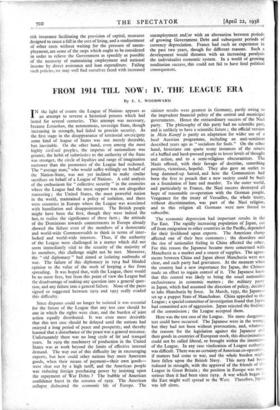THE BURDEN OF REARMAMENT
By THOMAS BALOGH
BUDGET Day has once more become an ominous occasion. Sir Thomas %skip's warning that we shall not sleep in our beds after seeing the Budget follows logically from the Prime Minister's insistence on the necessity of improving our position in the accelerated arms race.
The exceptional economic recovery which Great Britain enjoyed up till last autumn contributed greatly towards the cost of rearmament. The past financial year showed an increase of only £25.5 millions in the National Debt (some- what over £30 millions if certain capital items are taken into consideration) instead of the contemplated £8o millions. Though t6 millions less was spent on defence than originally budgeted for, total expenditure stood at £898 millions. In 1933-34 total expenditure did not exceed £719 millions. Even this year the Chancellor would have been faced with a relatively minor problem. He could count on a further increase in the yield of the income tax and of the N.D.C. This gain will presumably not be very substantially reduced by the shrinkage of indirect taxation, stamp and death duties. The published defence and civil estimates and the actual cost of the service of the National Debt last year foreshadow a Budget of roughly £ f,000 millions, with defence estimates at £343 millions, £90 millions of which it was supposed Would be met by borrowing. If the revenue is put to £900-910 millions, the gap appears to be very small, and could easily be closed by measures preventing tax evasion. So far so good. But a substantial immediate rise in defence expenditure has to be contemplated which is not included in the published figures, and supplementary estimates will probably also be necessary to cover increased unemployment relief. Moreover, next year we shall certainly be faced With a substatitial fall in the revenue resulting from the recent setback in economic activity. Thus the Chan- cellor is already at this juncture faced with the question whether to increase loan expenditure further or to increase taxation.
There is not merely a simple clash, but a deplorable con- fusion of opinions on this issue. Two distinct arguments are used to confound the pessimist. It is suggested that at least part of the increased expenditure can, with considerable justification, be transferred into the future by borrowing. it would then be amortised in that happier period which this expenditure is supposed to bring nearer. This argument was used officially when the borrowing of £400 millions was announced. The other argument goes even further. It is said that borrowing for rearmament is perfectly justifiable, not because later generations can reasonably be made to bear the burden, but, on the contrary, because the future cannot be compromised by the mere choice between present methods of finance. For even should defence expenditure be paid for by borrowing, the " real " burden is shouldered concurrently. Those who purchase the Government securi- ties forgo their right to spend or invest in some other direction the amounts transferred to the Government. Thus private demand will fall. Productive resources thus become unem- ployed and will be transferred to the production of arma- ments. These are paid for by the proceeds of the loans. Furthermore, the payment of interest on the accumulating National Debt, it is said, cannot cause complications .oecause it merely constitutes a redistribution of the national income, a transfer from one part of the population to another.
The fallacy of the first argument is amply demonstrated by the analysis of the second ; which in its turn is based on the erroneous assumption that the redistribution of the national income cannot determine its size.* The history of the last six months in America seems to afford a warning that taxation may rise to such levels as to discourage capitalists from entering upon risky commitments. For any profits which may result would be heavily reduced by taxes, whereas losses must be borne by the investor. Such taxation may induce people to hoard instead of investing, and so in the end reduce the national income. But even if we neglect the unfavourable effects of an increase in taxation on national income, there are very cogent reasons for believing that progress will be more difficult in future than it has been in the past. In the nineteenth century the population was increasing rapidly and there were vast possibilities of profitable investment at home, and probably even more abroad. The period was relatively free from political risks. All this has changed, and it is probable that investment will be less attractive in future. At the same time very much the same risks will tend to increase the unwillingness either to lend or to invest of those who have command over savings.
This undoubtedly is a most disturbing prospect. But it is not enough to reject the over-optimistic views on the present outlook without putting forward positive suggestions to solve the problem or at least to alleviate the difficulties. If an increase of the national debt tended to depress national income in future, would a decrease of the national income not have the same effect with the national d:bt remaining unchanged ? The flow of current savings is at present not fully absorbed by private investment demand and Government loan expenditure. Private demand, moreover, seems still to be shrinking. If taxation is raised, it will probably fall still further. Thus, in the absence of some new factor reversing this trend, the capacity of the country would be diminished by increasing taxation as there would be a general destruction of capital values and subsequently also of physical capital equipment. The ultimate position is likely to be even worse because the shrinkage of national income will continue until net savings vanish or a budget deficit appears as a result of the continued fall in the revenue. In the meanwhile the slimming process involves unemployment and hardship. Therefore a realistic interpretation of the future does not support measures which would reduce private demand and national income more than is necessary to accommodate rearmament without a general rise in prices. The French and American experiences between 1930 and 1933 should have demonstrated this point.
This analysis tends to show that financial policy at this moment should be concentrated on the task of maintaining national income even at the cost of some increase in the national debt. At the same time every effort should be made to remove the obstacles in the way of a restoration of private investment.
The deflation of 1929-1931 was overcome by the combined effect of currency depreciation, tariffs, cheap money, and last but not least by the fall in the price of imports which set free demand for durable goods, especially houses and motor-cars. These stimuli seem to have exhausted their effectiveness and cannot (at least in the short run) be relied upon to restart expansion, though cheap money remains an essential element of any constructive policy. We have been very much favoured by fortune in the past six years. Now a financial policy very much more conscious of economic necessities is needed if the same results are to be obtained. A revision of our system of taxation so as to diminish the risk element in investment, an extension of the system of * See the cogent article by Professor Robbins in the current issue of Lloyds Bank Review. risk insurance facilitating the provision of capital, measures designed to cause a fall in the cost of living, and a readjustment of other costs without waiting for the pressure of unem- ployment, are some of the steps which ought to be considered in order to relieve the Government as speedily as possible of the necessity of maintaining employment and national income by direct assistance and loan expenditure. Failing such policies, we may well find ourselves faced with increased unemployment and; or with an alternation between periods of growing Government Debt and subsequent periods of currency depreciation. France had such an experience in the past two years, though for different - reasons. Such a development would threaten with an increasing paralysis the individualist economic system. In a world of growing totalitarian success, this could not fail to have fatal political consequences.











































 Previous page
Previous page